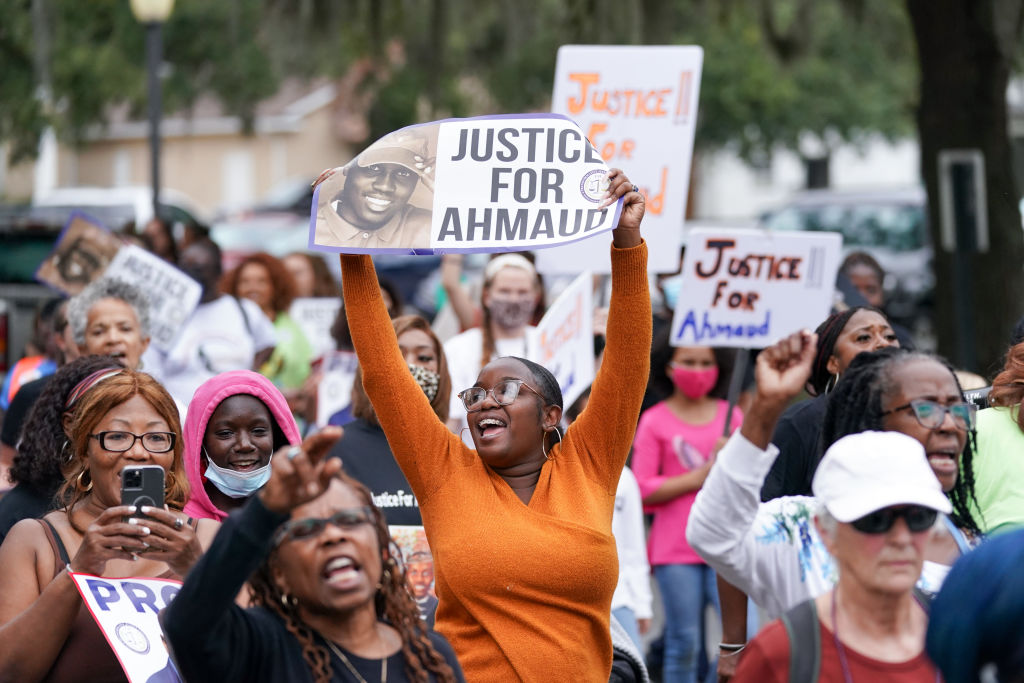The jurors who convicted the killers of Ahmaud Arbery delivered accountability after a shocking crime, prosecutorial misconduct and an often disappointing trial. Their just verdict was based on foundational constitutional principles, the law and the facts.
Travis McMichael, Gregory McMichael and William Bryan chased down and killed the unarmed Arbery as he jogged through the residential neighborhood of Brunswick, Georgia. Bryan filmed the attack, which culminated in Travis McMichael firing a shotgun at point blank range at Arbery.
For nearly two months, prosecutors refused to file charges or even arrest the killers. Then Bryan’s film was leaked, a public uproar ensued, and the Georgia Bureau of Investigation took over the case. One prosecutor was voted out of office and is under indictment for obstruction of justice after she allegedly used her position to protect the McMichaels. A bipartisan Georgia coalition, led by Governor Brian P. Kemp, reformed Georgia’s citizen arrest law under which Arbery’s killers claimed they were acting.
The jury convicted Travis McMichael of all nine counts of the indictment, including malice murder. The jury convicted Gregory McMichael and William Bryan of most charges, including felony murder. All three men face potential life imprisonment. The federal government will now proceed with hate crimes charges against the lethal trio, one of whom allegedly uttered a racial slur as he stood over Arbery as the twenty-five-year-old breathed his last.
The government presented compelling evidence in this case, but the most damning evidence came from the defendants themselves.
First, this case never would have seen the light of day but for Bryan’s film. As with so many cases involving use of force, the jury believed their own eyes. The tape left no question that Arbery was attacked, defenseless, and brutally killed.
Second, all three defendants spoke to law enforcement and admitted their involvement in the killing. The government introduced these confessions at trial.
Third, under withering cross-examination, Travis McMichael admitted that Ahmaud Arbery never threatened him. This critical admission destroyed McMichael’s self-defense claim. McMichael further acknowledged that Arbery “was just running,” undercutting any pretense of reasonableness as to McMichael’s use of deadly force. McMichael never claimed to have personally witnessed Arbery committing a crime, which nullified the defendants’ belated claims to a citizens’ arrest.
The defense strove mightily to remove all potential African-American jurors from this trial (and nearly succeeded) and complained about the paucity of “Bubba[s] and Joe Six Pack[s]” on the jury; objected to the quiet presence of “black pastors” in the courtroom; and invoked racial stereotypes in closing argument.
But no citizen, regardless of color, should fear assault and murder while peaceably jogging through a neighborhood. A purported citizen’s arrest or self-defense claim ought never mask reckless vigilantism. The jury’s verdict was the common sense conclusion to a tragic case.
At a time when so much seems to be going wrong in the United States, every American may be grateful that the McMichael-Bryan jury rejected blatant race-based demagoguery and did the right thing. Let us hope this righteous verdict is another step on the long road to racial reconciliation and justice for all.
Rachel K. Paulose is a former US attorney for Minnesota (2006-08), a 1997 graduate of Yale Law School and a professor at the University of St. Thomas School of Law.


















